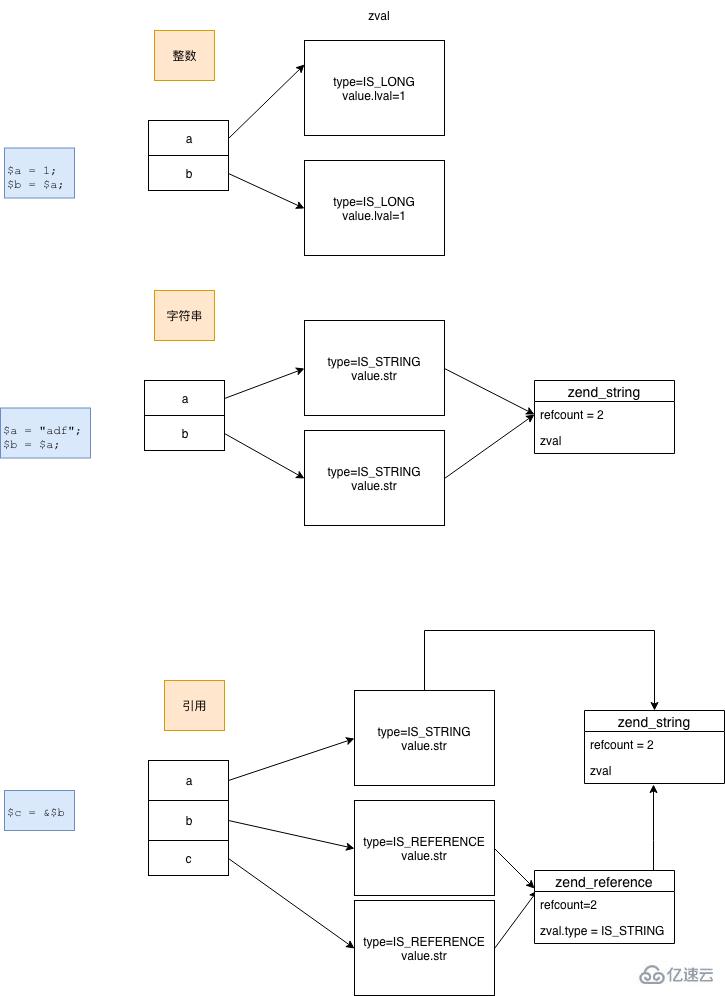您好,登錄后才能下訂單哦!
您好,登錄后才能下訂單哦!
變量的實現
PHP 的變量是弱類型的,可以表示整數、浮點數、字符串等類型。PHP 的變量是使用結構體 zval 表示的
PHP 5.* zval 和 zend_value 結構
struct _zval_struct { // 結構體
zvalue_value value;
zend_uint refcount__gc;
zend_uchar type;
zend_uchar is_ref__gc;
}
typedef union _zvalue_value { // 聯合體
long lval;
double dval;
struct {
char *val;
int len;
} str; // 字符串
HashTable *ht; // 數組
zend_object_value obj; // 對象
zend_ast *ast;
} zvalue_value;PHP 7.0 zval 和 zend_value 結構
struct _zval_struct {
union {
zend_long lval; /* long value */
double dval; /* double value */
zend_refcounted *counted;
zend_string *str;
zend_array *arr;
zend_object *obj;
zend_resource *res;
zend_reference *ref;
zend_ast_ref *ast;
zval *zv;
void *ptr;
zend_class_entry *ce;
zend_function *func;
struct {
uint32_t w1;
uint32_t w2;
} ww;
} value;
union {
struct {
ZEND_ENDIAN_LOHI_4(
zend_uchar type, /* active type */
zend_uchar type_flags,
zend_uchar const_flags,
zend_uchar reserved) /* call info for EX(This) */
} v;
uint32_t type_info;
} u1;
union {
uint32_t var_flags;
uint32_t next; /* hash collision chain */
uint32_t cache_slot; /* literal cache slot */
uint32_t lineno; /* line number (for ast nodes) */
uint32_t num_args; /* arguments number for EX(This) */
uint32_t fe_pos; /* foreach position */
uint32_t fe_iter_idx; /* foreach iterator index */
} u2;
};PHP5 與 PHP7 引用計數的對比
php 5.* 變量賦值等操作引用計數如圖所示,在倒數第二步,會形成一個循環引用,并且在 unset 操作之后,會產生垃圾。

PHP 7 的計數放到了具體的 value 中,zval 不存在寫時復制(寫時分離)。
并且 PHP 7 的有一個專門的 zend_reference 用來表示引用。

有了以上關于 PHP 變量存儲的知識,我們可以理解一下 PHP 是如何做垃圾回收的了。
什么是垃圾
首先,我們需要定義什么是垃圾。
1. refcount 增加的不是
2. refcount 等于0的不是,這個會被直接清除
3. refcount 減少,并且不等于0的才是垃圾
垃圾收集
1. php7 要求數據類型是數組和對象,并且 type_flag 是 IS_TYPE_COLLECTABLE
2. 沒有在緩沖區中存在過
3. 沒有被標記過
4. 標記為紫色,并且放到緩沖區中
PHP 5.3 版本以及之后的版本
1. 將垃圾放到一個 root 池中
2. 當滿 10000 個節點的時候進行垃圾回收
3. 遍歷雙向鏈表中的節點 refcount-1
4. 遍歷雙向鏈表將 refcount=0 的節點刪除,到free隊列中
5. 對 refcount!=0 的 refcount+1

以上就是PHP是如何做垃圾回收的(圖文)的詳細內容,更多請關注億速云其它相關文章!
免責聲明:本站發布的內容(圖片、視頻和文字)以原創、轉載和分享為主,文章觀點不代表本網站立場,如果涉及侵權請聯系站長郵箱:is@yisu.com進行舉報,并提供相關證據,一經查實,將立刻刪除涉嫌侵權內容。